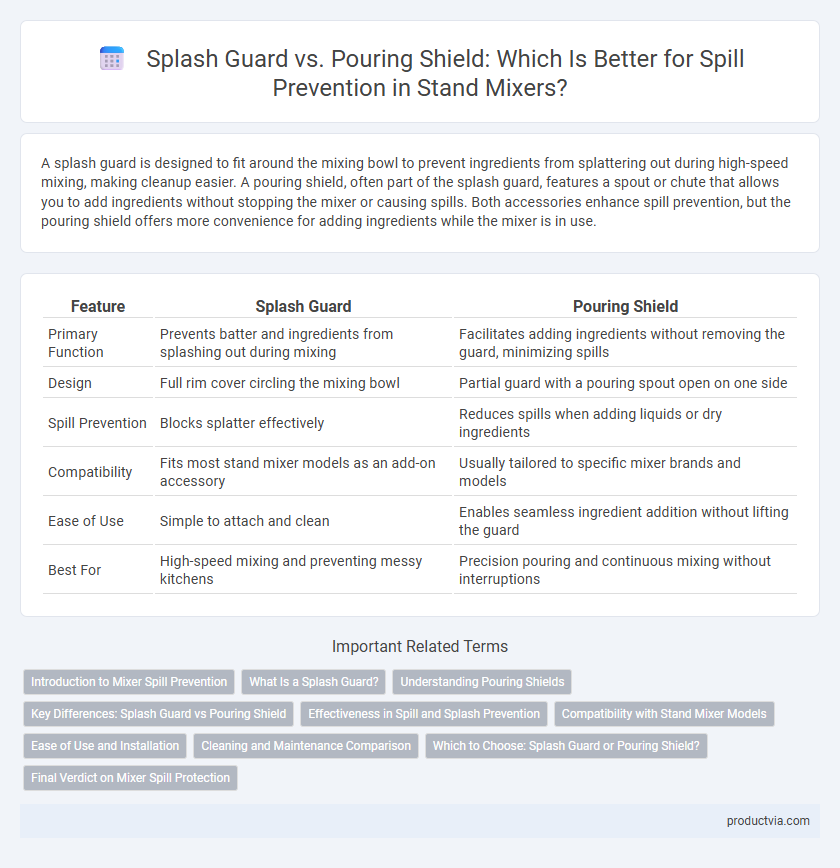A splash guard is designed to fit around the mixing bowl to prevent ingredients from splattering out during high-speed mixing, making cleanup easier. A pouring shield, often part of the splash guard, features a spout or chute that allows you to add ingredients without stopping the mixer or causing spills. Both accessories enhance spill prevention, but the pouring shield offers more convenience for adding ingredients while the mixer is in use.
Table of Comparison
| Feature | Splash Guard | Pouring Shield |
|---|---|---|
| Primary Function | Prevents batter and ingredients from splashing out during mixing | Facilitates adding ingredients without removing the guard, minimizing spills |
| Design | Full rim cover circling the mixing bowl | Partial guard with a pouring spout open on one side |
| Spill Prevention | Blocks splatter effectively | Reduces spills when adding liquids or dry ingredients |
| Compatibility | Fits most stand mixer models as an add-on accessory | Usually tailored to specific mixer brands and models |
| Ease of Use | Simple to attach and clean | Enables seamless ingredient addition without lifting the guard |
| Best For | High-speed mixing and preventing messy kitchens | Precision pouring and continuous mixing without interruptions |
Introduction to Mixer Spill Prevention
Splash guards and pouring shields both enhance stand mixer spill prevention by containing ingredients and reducing mess during mixing. A splash guard typically covers the bowl's top edge, preventing splatter, while a pouring shield features a chute that allows easy ingredient addition without stopping the mixer. Choosing the right accessory improves cleanliness and efficiency in baking tasks.
What Is a Splash Guard?
A splash guard is a protective accessory designed to fit over the mixing bowl of a stand mixer, effectively preventing ingredients from spilling or splattering during mixing. It features a raised lip or barrier that contains liquids and dry ingredients, maintaining a cleaner kitchen workspace. Unlike pouring shields, splash guards primarily focus on minimizing mess rather than facilitating ingredient addition through dedicated openings.
Understanding Pouring Shields
A pouring shield on a stand mixer provides a clear barrier that prevents ingredients from splattering during mixing, ensuring a cleaner kitchen environment. Unlike a basic splash guard that mainly blocks splashes, pouring shields feature an integrated chute for adding ingredients without stopping the mixer. This design enhances both convenience and spill prevention, making it an essential accessory for efficient baking and cooking.
Key Differences: Splash Guard vs Pouring Shield
A splash guard is designed to cover the mixing bowl completely, minimizing splatters during high-speed mixing, while a pouring shield primarily facilitates the addition of ingredients without removing the guard or causing spills. The splash guard typically features a seal or lip to block ingredients from escaping, whereas the pouring shield includes a chute or opening to pour liquids and dry ingredients directly into the bowl. Choosing between the two depends on whether spill prevention or ingredient incorporation during mixing is prioritized.
Effectiveness in Spill and Splash Prevention
Splash guards offer basic protection against minor splatters during mixing, but pouring shields provide a more comprehensive barrier that effectively contains both spills and splashes, especially with liquid or powder ingredients. Pouring shields often feature a built-in chute, allowing ingredients to be added seamlessly without removing the guard, reducing the risk of mess. The design and fit of pouring shields make them superior in preventing messy cleanups compared to standard splash guards.
Compatibility with Stand Mixer Models
Splash guards vary significantly in design and fit, making it essential to choose one compatible with specific stand mixer models to ensure effective spill prevention. Pouring shields often feature universal designs but may have varying degrees of compatibility depending on the mixer brand and bowl size, requiring verification before purchase. Checking manufacturer's specifications and user reviews helps secure optimal fit and functionality between the splash guard or pouring shield and the stand mixer.
Ease of Use and Installation
The splash guard offers simple installation with flexible edges that fit most stand mixer bowls, providing an easy way to reduce mess during mixing. Pouring shields, often designed as rigid attachments, can be slightly more complex to install but allow controlled ingredient addition without removing the guard, enhancing convenience. Both options effectively prevent spills, but splash guards prioritize quick setup while pouring shields focus on integrated functionality for ingredient pouring.
Cleaning and Maintenance Comparison
Splash guards typically have a simpler design with fewer crevices, making them easier to clean and maintain after use. Pouring shields often feature multiple openings and additional attachments, which can trap batter and require more thorough cleaning to prevent residue buildup. Choosing a splash guard can reduce cleaning time and effort, but pouring shields offer better spill prevention at the cost of more detailed maintenance.
Which to Choose: Splash Guard or Pouring Shield?
Choosing between a splash guard and a pouring shield for a stand mixer depends on your specific baking needs. A splash guard primarily prevents batter and dough from splattering out during high-speed mixing, making it ideal for messy ingredients like flour or frosting. In contrast, a pouring shield not only reduces splashes but also features a spout for adding liquids seamlessly, enhancing convenience during recipes that require gradual ingredient incorporation.
Final Verdict on Mixer Spill Protection
Splash guards and pouring shields both serve to minimize ingredients spilling during mixing, yet pouring shields offer enhanced coverage and a larger opening for ingredient addition without removing the guard. Splash guards typically fit snugly over the bowl to prevent splatter, but pouring shields provide superior spill prevention by combining splash protection with a convenient pour spout. For optimal mixer spill protection, pouring shields are generally recommended due to their versatility and effective containment of ingredients.
Splash guard vs pouring shield for spill prevention Infographic

 productvia.com
productvia.com